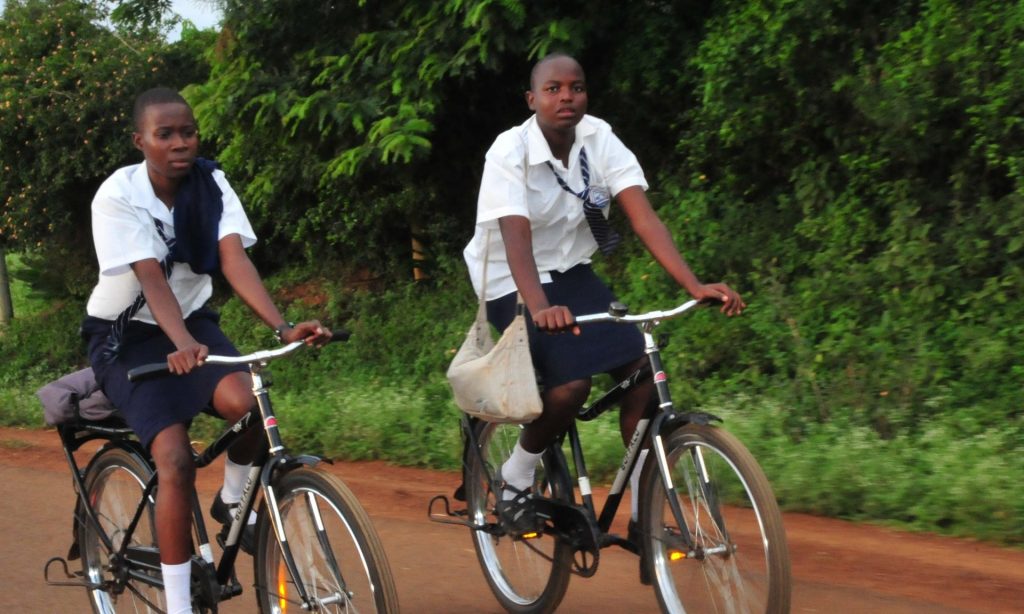Jacqueline Nasimiyu used to wake in the early hours and, after making breakfast and fetching water, she would trek down valleys, push through bushes and wiggle under barbed wire fences to cover the 6km to Mahanga K secondary school in western Kenya.
There were no school buses and no paved roads around her village of Mawa in Kakamega county. The 17-year-old’s parents could not afford to pay for the only form of transport, motorbike taxis, known as boda boda.
“I would wake up as early as 4am to do chores and still manage to arrive in school on time. I never had time to study,” says Jacqueline, who would like to become an agricultural officer when she finishes her studies.
One day, when she was running late, she begged a boda boda driver to take her for free. He agreed, but the price ended up being very high.
“When this man helped me get to school several times, I fell for him and conceived in 2014,” says Jacqueline, whose baby is now nine months old.
Today, girls in the region are able to get to school under their own steam.
World Bicycle Relief, a not-for-profit organisation, has launched a bicycles for education empowerment programme to help children travel between home and school.
As part of this scheme, 100 locally assembled Buffalo bicycles were donated to Jacqueline’s school. These bicycles are designed for rough roads, and are tested and assembled in Africa.
Matt Pierce, World Bicycle Relief’s creative director, says reducing the time it takes students to travel to and from school frees them to spend more time in class and doing homework.
“In rural villages across Ghana, Kenya, Malawi, South Africa, Zimbabwe and Zambia where we have donated bicycles for schools, we have reduced the commute time to school by 75%,” says Pierce.
For Jacqueline, who had resolved to run away from home when she discovered she was pregnant, the bicycles helped her get her life back on track.
Enock Keya, the principal of her school, said two of his teachers talked to Jacqueline’s parents, who finally agreed that she could go back to school once she had given birth.
“Nasimiyu is a bright girl, and when we realised she had been out of school for close to a week, we took the step to go and find her,” says Keya.
Under the bicycle scheme, local committees select the most needy pupils, who must all live at least 6km from the school.
“When I received a bike I was so happy. Now I have time to study, travel comfortably to school, and still help with the chores. I also ride my little brother to and from school,” says Jacqueline, whose grades have improved from an average C+ to B+ since she got her wheels.
According to a UN report last year (pdf), 63 million adolescents of lower secondary school age are out of school.
“Out-of-school rates for children of primary and lower secondary school age fell between 2000 and 2007, but this progress has stalled since 2007, with the primary and lower secondary out-of-school rates stuck at around 9 and 17% respectively,” says the report.
In rural Kenya, children face obstacles to education including poor infrastructure, poverty and gender inequality.
Judith Okungu of World Vision, a partner organisation in the project, says 917 bicycles have so far been donated across Kakamega county.
“In a household where there is a boy and a girl, the boy will wake and get ready for school while the girl will attend to house chores and then get ready for school. That’s why girls take a bigger percentage of the bicycles – 75% are given to girls,” Okungu says.
Underage sex is common in western Kenya, she says, partly because of poverty. “You’ll find that many girls opt to engage in sex to pay for meeting their basic needs because their parents are poor,” she says.
According to a report by the UN committee on the rights of the child, a large number of children in Kenya are living in child-headed households; Kakamega county is ranked second, with more than 21,600.

Keya says this makes it difficult to keep children in school, while early marriage and child labour can also prematurely end girls’ education in Kenya.
World Bicycle Relief, working with its partners and the Ministry of Education, distributed more than 3,000 bicycles to 22 schools in Uasin Gishu, Kakamega and Siaya counties last year, and expects to give out 5,000 in 2016.
Nelly Soita, 18, was given a bicycle and she sees it as a powerful weapon in her battle to continue her education despite her parents’ resistance.
“When I gave birth in 2014, my parents were not prepared to send me to the school because it was far away and there was no transport. They did not want me to walk to school every day, but this bicycle has changed all that,” she says with a smile.

